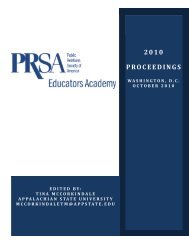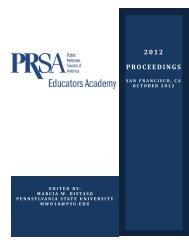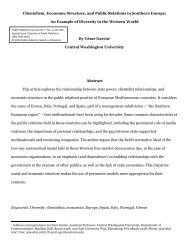2008 PROCEEDINGS - Public Relations Society of America
2008 PROCEEDINGS - Public Relations Society of America
2008 PROCEEDINGS - Public Relations Society of America
Create successful ePaper yourself
Turn your PDF publications into a flip-book with our unique Google optimized e-Paper software.
How the PRSA’s Certification in Education for <strong>Public</strong> <strong>Relations</strong> Effected a Transformation<br />
<strong>of</strong> a Private University in Argentina into a Community <strong>of</strong> Practice and<br />
Enhanced Its Reputation<br />
Marcelo Baró<br />
Universidad Argentina de la Empresa<br />
mbaro@uade.edu.ar<br />
Background<br />
It can be argued that <strong>Public</strong> <strong>Relations</strong> arrived in Argentina with the Spanish colonization.<br />
The pr<strong>of</strong>ession, however, did not really begin until the arrival <strong>of</strong> the first multinational<br />
companies in 1910. <strong>Public</strong> <strong>Relations</strong> practitioners were mainly press agents while publicity was<br />
used for decades to address strong national feelings and interests against foreign corporations,<br />
especially during Peron’s ruling. It was not until the mid-50s, during a short economic boom,<br />
that corporations started recognizing the need <strong>of</strong> better prepared pr<strong>of</strong>essionals in <strong>Public</strong><br />
<strong>Relations</strong>.<br />
At that time, several companies transferred their communications specialists to<br />
Argentina. Others sent their brightest employees to <strong>America</strong>n universities. But many, grouped in<br />
the Cámara de Sociedades Anónimas, decided to found a university that would <strong>of</strong>fer different<br />
programs in business. With this clear mission, the Universidad Argentina de la Empresa<br />
(UADE) was established in 1963, and a year later, it <strong>of</strong>fered the first <strong>Public</strong> <strong>Relations</strong> degree in<br />
the country. Soon, other universities followed. These <strong>Public</strong> <strong>Relations</strong> programs, though, were<br />
not very popular for several reasons. First, privately-run universities at that time were considered<br />
to <strong>of</strong>fer a second-class education. Second, the pr<strong>of</strong>ession was still associated with social<br />
promoters rather that with communication specialists. And last, but more important, few were<br />
willing to participate in public issues because <strong>of</strong> the military governments <strong>of</strong> the time.<br />
For almost forty years, UADE has been a leader in <strong>Public</strong> <strong>Relations</strong> Education in the<br />
country and has had about 30% <strong>of</strong> all PR students. With the consolidation <strong>of</strong> democracy and the<br />
steep influence <strong>of</strong> globalization during the late ‘90s, the university enrollment started to rocket<br />
and there was a real need for, on the one hand, the improvement <strong>of</strong> its structure and culture and,<br />
on the other, for excellence in education. Foreign solutions, which were frequently promoted by<br />
international cooperative organizations, such as UNESCO and the IMF, have already<br />
transformed Argentina’s educational system at all levels. Some universities quickly adopted<br />
international education standards to further improve their performance, but only a few had<br />
realized the importance <strong>of</strong> undergoing certification processes, which are widely accepted in the<br />
United States <strong>of</strong> <strong>America</strong> and Europe. This is indeed paradoxical as globalization began to affect<br />
educational systems already in the 1990s, and researchers in Comparative Education and<br />
Education Authorities have analyzed international certification processes and recommended their<br />
implementation ever since. In <strong>Public</strong> <strong>Relations</strong>, this is particularly striking. Only UADE, out <strong>of</strong><br />
fifteen Argentine universities <strong>of</strong>fering undergraduate studies in <strong>Public</strong> <strong>Relations</strong>, decided to<br />
undertake the PRSA’s certification process in 2005. UADE is in fact one <strong>of</strong> two other<br />
universities outside <strong>of</strong> the United States <strong>of</strong> <strong>America</strong> to have certified programs.<br />
Critics argue that certification does not constitute a real transfer <strong>of</strong> creative solutions, but<br />
merely a way to legitimize educational policies. At UADE, nonetheless, the certification has<br />
changed the school’s culture, more specifically its Department <strong>of</strong> <strong>Public</strong> <strong>Relations</strong>, into a<br />
community <strong>of</strong> practice. This concept is currently prevalent in several educational venues and<br />
research contexts. Lave and Wenger (1991) defined a community <strong>of</strong> practice as<br />
115
















